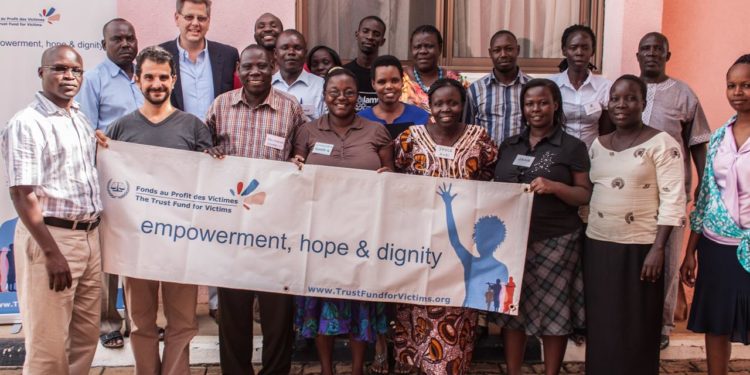By Susan Kendi and Thomas Verfuss
The ICC Trust Fund for Victims has assistance programs in Uganda and the Democratic Republic of the Congo for 11 years and provided assistance to 150,000 people and 65,000 respectively.
During the sidelines of the 18th session of the Assembly of State Parties held in World Forum, Hague, Journalists For Justice reporters Susan Kendi and Thomas Verfuss sat down with the Chairman of Trust Fund for Victims, H.E Felipe Michelini and Trust Fund for Victims Uganda Programs Manager Scott Bartell to find out their experience in delivering assistance to victims in different African countries.
This is the second installment of the two part interview.
JFJustice: We know that the trust fund for victims has been offering some assistance mandate in some African countries.
Felipe Michelini: Well has been very good in terms of once we know what we have to do and Scott can tell you his experience as a project manager in Uganda and other countries that he has been working with. So I give the floor to him.
Scott Bartell: For example what we have been doing in another places, we have had a program in Uganda for 11 years. We have had a program in the Eastern Democratic Republic of the Congo for 11 years as well. In Uganda, we have been implementing a program providing medical treatment to victims, counselling, psychosocial support and livelihood activities. We have managed to provide assistance to 150,000 people over our eleven years of programming. Similarly, in the Congo we have been implementing programs of livelihood, counseling and some medical support and I think there we have managed to assist more than 65,000 people in that same time period.
Scott Bartell: So we do have some understanding about how to implement programs, we have ideas, once we have a report for the board to consider and the board makes a determination that yes, an assistance program should be set up in a given situation and we have certain mechanisms in place on how we how we should do that. But a particular program in each country is informed by particular assessment. The types of injuries that occur, the types of categories of victims is different from situation to situation. So we will be looking at developing programs.
Scott Bartell: The trust fund in general we have to work through implementing partners, we have to partner with local NGOs and other organizations that provide the livelihood, provide the medical assistance and provide the counseling and so we will have to partner with them. We try to pick organizations with certain technical capacity and experience implementing those types of activities but also have experience in that context, in that environment and understand the context of the conflict and are able to work with the communities.
JFJustice: Having worked in different African countries what are some of the lessons that the Trust Fund for Victims has learnt?
Felipe Michelini: The first lesson is that you cannot step in
[a country]
if you don’t have a clear plan with local partners, [or] with a script because the expectations of people, the communities, families, organizations and victims and survivors are very high. They think that the trust fund can do many things that we can do but we can do very little.
Felipe Michelini: The second thing is that, we have to clearly identify which are the real needs for certain populations. So it is not just to come and to start guessing or playing God these are their needs and these are not. We have to identify clearly what the needs for those victims, survivors and affected communities.
Felipe Michelini: Third, we have to do in a transparent way. It cannot be done in a way that the trust fund can be accused of choosing the wrong partners, that the money does not go to the people and these kind of things and that takes time to do it that way. So we hope that once we receive the report on resolve it we will have a short time, all these points resolved to do our best in Kenya.







